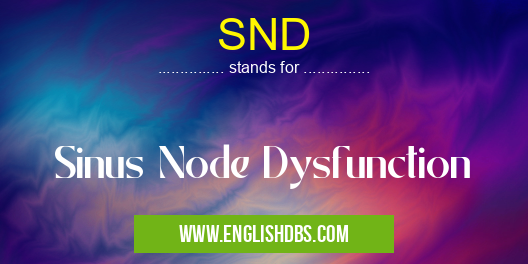What does SND mean in UNCLASSIFIED
SND (Sinus Node Dysfunction) is a cardiac condition characterized by the inability of the sinus node to generate electrical impulses at a normal rate or in a consistent manner. The sinus node is a small group of cells located in the right atrium of the heart that acts as the heart's natural pacemaker, initiating each heartbeat.

SND meaning in Unclassified in Miscellaneous
SND mostly used in an acronym Unclassified in Category Miscellaneous that means Sinus Node Dysfunction
Shorthand: SND,
Full Form: Sinus Node Dysfunction
For more information of "Sinus Node Dysfunction", see the section below.
Types of SND
SND can be classified into various types based on its severity and underlying cause:
- Sinus Bradycardia: A slow heart rate, typically below 60 beats per minute.
- Sinus Tachycardia: A fast heart rate, typically exceeding 100 beats per minute.
- Sick Sinus Syndrome: A combination of bradycardia and tachycardia, often with episodes of standstill (asystole).
Symptoms of SND
The symptoms of SND can vary depending on the type and severity of the condition. Common symptoms include:
- Dizziness, lightheadedness, or fainting
- Fatigue
- Chest pain or discomfort
- Difficulty breathing
- Shortness of breath
- Cognitive impairment
Causes of SND
The causes of SND are often multifactorial and can include:
- Aging
- Heart disease
- Thyroid disorders
- Diabetes
- Sleep apnea
- Medications (e.g., beta-blockers, calcium channel blockers)
- Sarcoidosis
Diagnosis of SND
SND is diagnosed through a thorough medical evaluation, including:
- Physical examination
- Electrocardiogram (ECG)
- Event recorder
- Echocardiogram
Treatment of SND
The treatment for SND depends on the type and severity of the condition. Treatment options may include:
- Medications (e.g., pacemakers, beta-blockers)
- Cardiac ablation
- Surgery
Essential Questions and Answers on Sinus Node Dysfunction in "MISCELLANEOUS»UNFILED"
What is Sinus Node Dysfunction (SND)?
SND is a condition in which the sinus node, which is the natural pacemaker of the heart, malfunctions. This can lead to irregular or slow heart rhythms.
What causes Sinus Node Dysfunction (SND)?
SND can be caused by a variety of factors, including: aging, heart disease, diabetes, and certain medications. In some cases, no specific cause can be identified.
What are the symptoms of Sinus Node Dysfunction (SND)?
Symptoms of SND can include: dizziness, lightheadedness, fainting, fatigue, chest pain, and shortness of breath.
How is Sinus Node Dysfunction (SND) diagnosed?
SND is diagnosed based on a medical history, physical examination, and electrocardiogram (ECG).
How is Sinus Node Dysfunction (SND) treated?
Treatment for SND depends on the severity of the condition and symptoms. Treatment options may include medications, pacemaker therapy, or surgery.
What is the prognosis for Sinus Node Dysfunction (SND)?
The prognosis for SND varies depending on the severity of the condition and the underlying cause. With proper treatment, most people with SND can live full and active lives.
Final Words: SND is a complex cardiac condition that can significantly impact heart health. Early diagnosis and appropriate treatment are essential to manage symptoms and prevent complications such as arrhythmias and heart failure. Regular medical follow-up and lifestyle modifications, such as exercise and a healthy diet, are important for individuals with SND to maintain their overall well-being.
SND also stands for: |
|
| All stands for SND |
